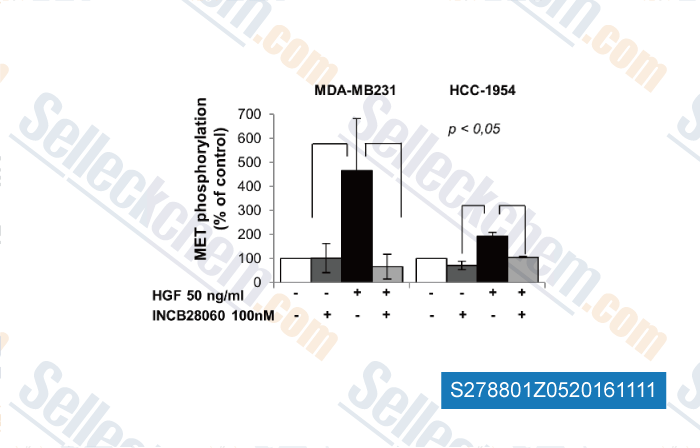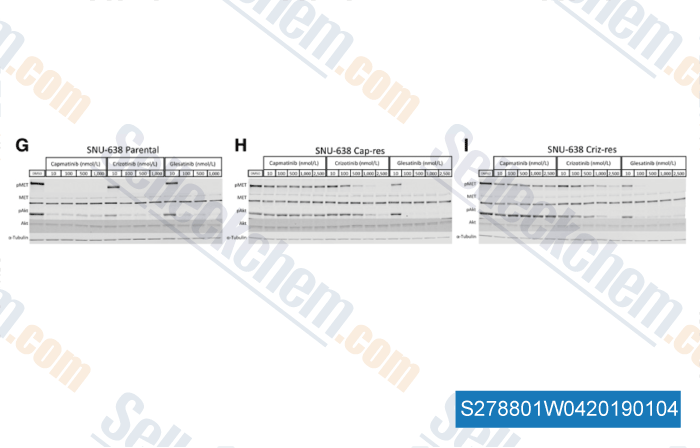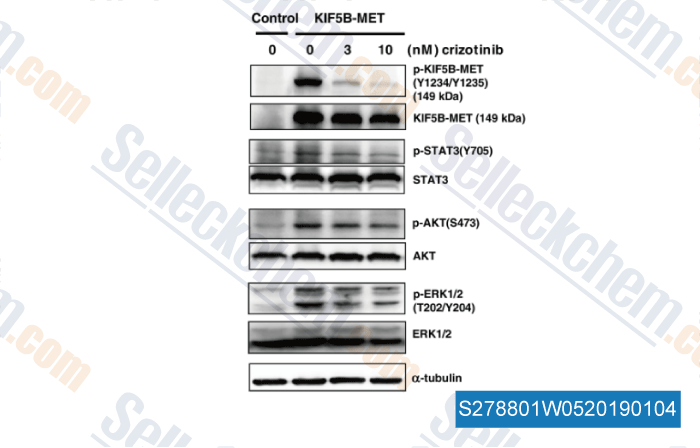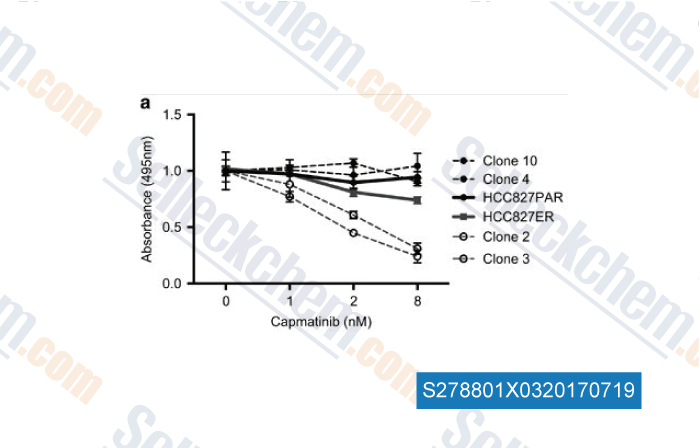|
Toll Free: (877) 796-6397 -- USA and Canada only -- |
Fax: +1-832-582-8590 Orders: +1-832-582-8158 |
Tech Support: +1-832-582-8158 Ext:3 Please provide your Order Number in the email. |
Technical Data
| Formula | C23H17FN6O |
|||
| Molecular Weight | 412.42 | CAS No. | 1029712-80-8 | |
| Solubility (25°C)* | In vitro | DMSO | 1.87 mg/mL (4.53 mM) | |
| Water | Insoluble | |||
| Ethanol | Insoluble | |||
|
* <1 mg/ml means slightly soluble or insoluble. * Please note that Selleck tests the solubility of all compounds in-house, and the actual solubility may differ slightly from published values. This is normal and is due to slight batch-to-batch variations. * Room temperature shipping (Stability testing shows this product can be shipped without any cooling measures.) |
||||
Preparing Stock Solutions
Biological Activity
| Description | Capmatinib is a novel, ATP-competitive inhibitor of c-MET with IC50 of 0.13 nM in a cell-free assay, inactive against RONβ, as well as EGFR and HER-3. Capmatinib (INCB28060) inhibits Wnt/β-catenin and EMT signaling pathways and induces apoptosis in diffuse gastric cancer positive for c-MET amplification. Phase 1. | ||||
|---|---|---|---|---|---|
| Targets |
|
||||
| In vitro | INCB28060 exhibits picomolar enzymatic potency and is highly specific for c-MET with more than 10,000-fold selectivity over a large panel of human kinases. INCB28060 inhibits human c-MET phosphorylation and c-MET-mediated signaling in cancer cells. INCB28060 inhibits c-MET-dependent cell proliferation and survival, and prevents anchorage-independent cancer cell growth and cell migration. [1] |
||||
| In vivo | INCB28060 shows strong antitumor activity in c-MET-dependent mouse tumor models, even oral treatment of 0.03 mg/kg INCB28060 causes approximately 50% inhibition of c-MET-phosphorylation. Dose-dependent inhibition of tumor growth is observed in tumor-bearing mice. [1] |
||||
| Features | Inactive against RONβ, another member of the c-MET RTK family, as well as EGFR and HER-3 (members of the EGFR RTK family). |
Protocol (from reference)
| Kinase Assay: |
|
|---|---|
| Cell Assay: |
|
| Animal Study: |
|
References
|
Customer Product Validation

-
, , PLoS One, 2016, 11(3):e0150507.

-
Data from [Data independently produced by , , Clin Cancer Res, 2017, 23(21):6661-6672]

-
Data from [Data independently produced by , , Neoplasia, 2018, 20(8):838-847]

-
Data from [Data independently produced by , , Oncogenesis, 2017, 6(4):e307]
Selleck's Capmatinib has been cited by 80 publications
| MUC1-C Is a Common Driver of Acquired Osimertinib Resistance in NSCLC [ J Thorac Oncol, 2023, 10.1016/j.jtho.2023.10.017] | PubMed: 37924972 |
| Suppression of TNBC metastasis by doxazosin, a novel dual inhibitor of c-MET/EGFR [ J Exp Clin Cancer Res, 2023, 10.1186/s13046-023-02866-z] | PubMed: 37924112 |
| FGFR blockade inhibits targeted therapy-tolerant persister in basal FGFR1- and FGF2-high cancers with driver oncogenes [ NPJ Precis Oncol, 2023, 7(1):107] | PubMed: 37880373 |
| FGFR blockade inhibits targeted therapy-tolerant persister in basal FGFR1- and FGF2-high cancers with driver oncogenes [ NPJ Precis Oncol, 2023, 7(1):107] | PubMed: 37880373 |
| EZH2/hSULF1 axis mediates receptor tyrosine kinase signaling to shape cartilage tumor progression [ Elife, 2023, 12e79432] | PubMed: 36622753 |
| MET exon 14 skipping mutation is a hepatocyte growth factor (HGF)-dependent oncogenic driver in vitro and in humanized HGF knock-in mice [ Mol Oncol, 2023, 10.1002/1878-0261.13397] | PubMed: 36799689 |
| MET kinase inhibitor reverses resistance to entrectinib induced by hepatocyte growth factor in tumors with NTRK1 or ROS1 rearrangements [ Cancer Med, 2023, 12(5):5809-5820] | PubMed: 36416133 |
| MET kinase inhibitor reverses resistance to entrectinib induced by hepatocyte growth factor in tumors with NTRK1 or ROS1 rearrangements [ Cancer Med, 2023, 12(5):5809-5820] | PubMed: 36416133 |
| MET Inhibitor Capmatinib Radiosensitizes MET Exon 14-Mutated and MET-Amplified Non-Small Cell Lung Cancer [ bioRxiv, 2023, 10.1101/2023.10.26.564232] | PubMed: 37961176 |
| MET exon 14 skipping mutation is a hepatocyte growth factor (HGF)‐dependent oncogenic driverin vitroand in humanizedHGFknock‐in mice. [ Molecular Oncology, 2023, Volume17, Issue11] | PubMed: none |
RETURN POLICY
Selleck Chemical’s Unconditional Return Policy ensures a smooth online shopping experience for our customers. If you are in any way unsatisfied with your purchase, you may return any item(s) within 7 days of receiving it. In the event of product quality issues, either protocol related or product related problems, you may return any item(s) within 365 days from the original purchase date. Please follow the instructions below when returning products.
SHIPPING AND STORAGE
Selleck products are transported at room temperature. If you receive the product at room temperature, please rest assured, the Selleck Quality Inspection Department has conducted experiments to verify that the normal temperature placement of one month will not affect the biological activity of powder products. After collecting, please store the product according to the requirements described in the datasheet. Most Selleck products are stable under the recommended conditions.
NOT FOR HUMAN, VETERINARY DIAGNOSTIC OR THERAPEUTIC USE.
